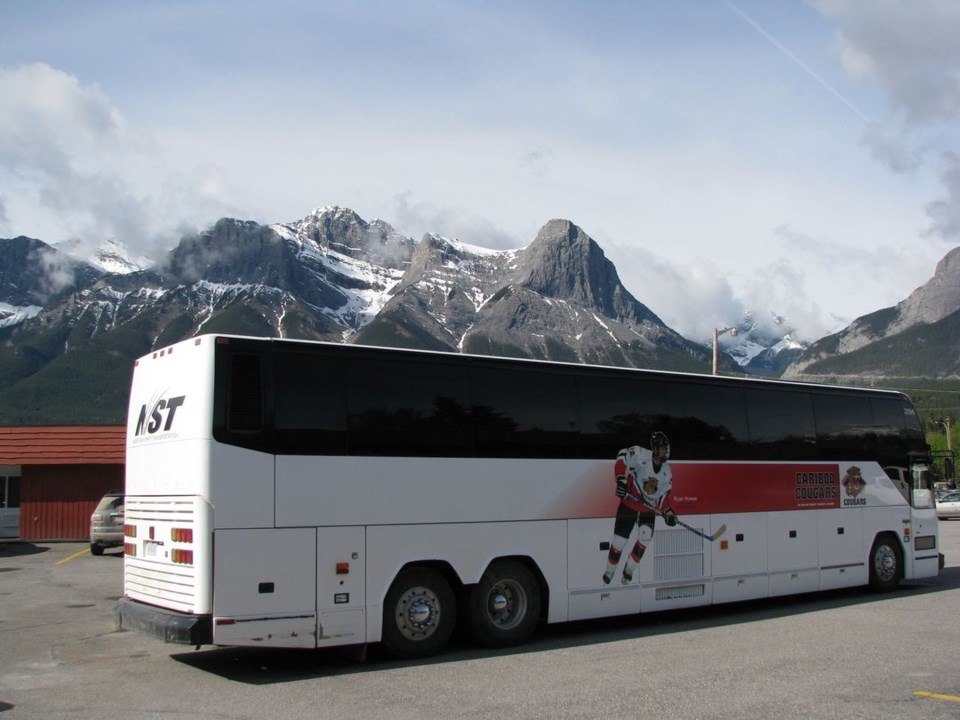Sports teams and athletes traveling to out-of-town tournaments are in for a shock if fuel prices remain at their current record levels.
The war in Ukraine that started in February and put the pinch on world supplies has pushed the price of a barrel of oil to close $120 US and that’s added between 50 and 60 cents to the price of a litre of diesel fuel, which buses depend on to keep them rolling on B.C. highways.
Operators of bus services such as Northern Spirit Transportation Services in Prince George say they have no choice but to pass on the rising costs of fuel, labour and parts to their customers.
“The cost of business is going up and it will affect hockey teams, it will volleyball teams and it will affect school groups, and that cost of renting those buses is gong to trickle down to the parents,” said Paul Clermont, Northern Spirit’s chief executive officer.
“Even labour and parts and maintenance and everything has just gone up. Before, where you could probably do a charter for $1,400 per day, you’re probably doing it at $1,900 now. That adds up over the course of a weekend for kids, then they’re eating on the road and staying in hotels. It’s going to affect the recreation side and I feel sorry for the parents because hockey is already expensive.”
In B.C., the average price of a litre of diesel fuel jumped from $1.75 on Feb. 28 to the current price of $2.32. In Prince George, some filling stations are selling at $2.15. Clermont said the cost of filling the fuel tank of a bus has jumped from $700-800 about a year ago to $1,400 or $1,500.
Provincial taxes on diesel add 28.01 cents to the price of a litre of diesel in all areas of the province except the South Coast, where motorists are taxed 40.51 cents per litre, and Victoria, where they pay 35.51 cents in tax. Gasoline taxes vary from 38.05 (South Coast) to 31.05 cents (Victoria) to 25.55 cents (rest of B.C.). Of those totals, the carbon tax adds 11.05 cents to the price of gasoline and 13.01 cents to diesel costs.
Northern Spirit devotes a large percentage of its fleet of 34 buses and 50 drivers to serve the mining industry and variations in the price of fuel are buffered into price companies have to pay to bus their employees. Clermont said the Coastal Gas Link pipeline now under construction has led to a shortage of qualified drivers, which has driven up wages.
“It’s trickling down everywhere, whether it’s goods and services or whether it’s groceries, it’s going to come down to the consumer,” said Sandra Clermont, Northern Spirit’s general manager.
“Maybe we need to lobby the provincial government and say that spending a billion dollars on a museum in Victoria is a really stupid idea. That could be some form of a tax-relief for people. Maybe they need to put some money back into giving some fuel subsidies so that doesn’t get passed on to the consumer.”
Housing shortages and the price of homes are adding significantly to the economic crunch people are feeling all over B.C., and Sandra Clermont says the province has to act soon to deal with a looming crisis.
“It’s difficult to think of people who are already living on that bubble between losing things and how they have to get to and from and fuel for their vehicles and pay for that kind of a difference, to go up 50 or 60 cents in less than six months,” she said.
Truckers are feeling the pinch as well.
“In our industry we have no choice but to pass it on to the consumer,” said Phil Bandstra, president of Bandstra Trucking. “Costs are up to 60 per cent and it’s not just fuel, there’s also labour issues and all kinds of other issues. There’s very little pushback from customers because they’re buying from the pump, too, and they understand.”
The Smithers-based company serves mostly the mining, energy and forestry sectors but its 130-truck fleet also moves goods for consumers, utilizing a pool of 150 drivers. Bandstra said some trucking outfit are locked in to deliver services on long-term contracts but his company adjusts what it charges for its deliveries every two or three weeks.
“There’s no doubt about it, between fuel, labour and all the restraints on the world market it’s been a real challenge,” Bandstra said.



